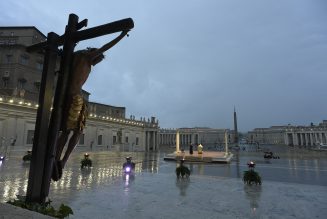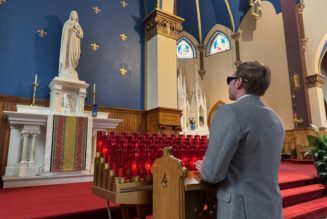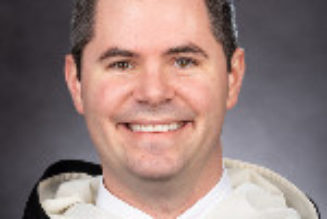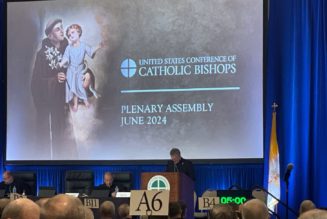, September 17, 2020

In this Sunday’s Gospel, the 25th Sunday of Ordinary Time Year A, Jesus tells the story of the laborers who each receive the same pay whether they worked an hour a whole day.
The parable has a beautiful meaning on the literal level — and a life-defining meaning on the spiritual level.
The story could literally be about the living wage.
We are used to thinking of the story of the laborers as a scenario that couldn’t happen in real life. But maybe it could.
“The kingdom of heaven is like a landowner who went out at dawn to hire laborers for his vineyard,” Jesus’s story begins. Harvesting is always a frantic time — especially for a time-sensitive crop like grapes. To get all of a large vineyard’s grapes in on time takes many hands, and this landowner starts at dawn to get as many laborers as he can, and he returns to town all day to get more.
The supply of laborers is low and the demand is high at harvest time. A landowner could easily make the calculation that paying a picker a day’s wages, such that he is able to support his family, is a good idea, whether the worker works for a full day or not. That way, he is more likely to have enough pickers the next day, too.
It is also the right thing to do: The day’s wage in the New Testament is literally what a family needs to live for a day. If you can, why wouldn’t you give your workers what they need to survive?
On the spiritual level, however, the story is life changing.
When we apply the parable to the spiritual life, we need to think about it totally differently, however. As the first reading from Isaiah points out: “My thoughts are not your thoughts, nor are your ways my ways, says the Lord. As high as the heavens are above the earth, so high are my ways above your ways.”
For one, the work we do for our earthly employer contributes to our employer’s livelihood. In our spiritual life, the work we do for God contributes to us, not him. Looked at from God’s eyes, the parable becomes a perfect illustration of what the Church teaches about merit.
First, notice that the workers don’t go knocking at the landowner’s door in the parable. The landowner finds them. This is the same for us. Jesus looks for us, not the other way around. Says the Catechism, “The initiative belongs to God in the order of grace, no one can merit the initial grace of forgiveness and justification, at the beginning of conversion.”
Second, the very act of paying everybody the same regardless of the length of time they worked shows the divine benevolence that we all experience. “The charity of Christ is the source in us of all our merits before God,” says the Catechism, then quotes St. Thérèse of Lisieux, who says: “In the evening of this life, I shall appear before you with empty hands, for I do not ask you, Lord, to count my works.”
Last, the wages that we get from the Landowner — what we “earn” when we unite our efforts to Christ’s charity — is huge. “Moved by the Holy Spirit, we can merit for ourselves and for others all the graces needed to attain eternal life,” says the Catechism.
The heavenly wages are so great that death might seem better than living.
In the Second Reading, Paul admits that he longs for death, because it brings heaven. “For to me, life is Christ, and death is gain,” he says. “I do not know which I shall choose. I am caught between the two. I long to depart this life and be with Christ, for that is far better. Yet that I remain in the flesh is more necessary for your benefit.”
Paul wants to keep working in Christ in order to spread the faith on earth — but he also wants the wages that follow in heaven.
What are those wages? They are the “living wage” necessary for eternity. Jesus says in the Gospel of John, “In my Father’s house there are many dwelling places,” and “I will come back again and take you to myself, so that where I am you also may be.” The “dwelling places” Jesus is preparing for us will be part of a “new heavens and a new earth,” says the Book of Revelation. Heaven will be a home we know and love, not an alien world where we are foreigners.
Says Revelation: “He will wipe away every tear from their eyes, and death shall be no more; neither shall there be mourning nor crying nor pain any more, for the former things have passed away” (Revelation 21:4).
That is quite a wage. But don’t forget: It takes work.
I love the recent headline on the satire news site Babylon Bee: “Man Going To Pray About Volunteering At Church For One Hour Every Other Month”
In the story, a church secretary asks churchgoer William Langton to volunteer to serve. “I’ll certainly pray about it and see if the Lord guides me toward making this commitment,” Langton answers. The secretary crosses his name off of her list of possible volunteers.
Sometimes we think the “work” of our faith life is our prayer time, or our time at church, our time reading the Bible. Or we think it is the time we let God heal us — in the confessional or in his illumination of our life circumstances.
This and other parables correct that misunderstanding. Jesus isn’t inviting us just to chat with him. He isn’t inviting us to a one-way relationship where he serves us; he has tasks he wants us to do for him in the world.
The Christian life is a way of “fruitful labor,” in Paul’s words, not just a way of prayer. If our Christian life doesn’t feel like work (joyful work, but definitely work), we’re not doing it right.
“Why do you stand here idle all day?” Jesus is asking. “You too go into my vineyard.”
Tags: 25th Sunday in Ordinary Time Year A
, prayer, Sunday Gospel, Sunday Readings
Never miss a post! Subscribe below to our weekly newsletter.









